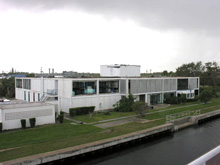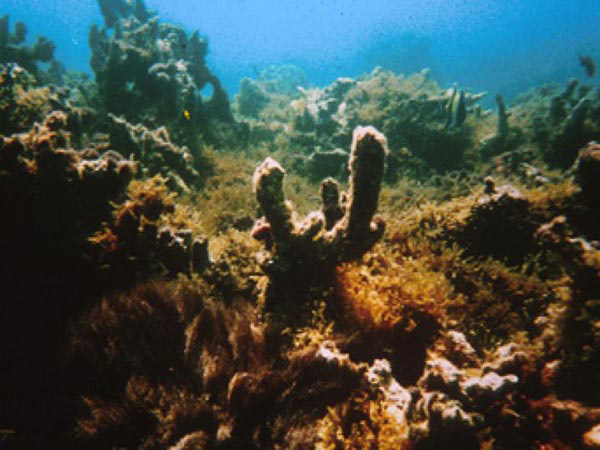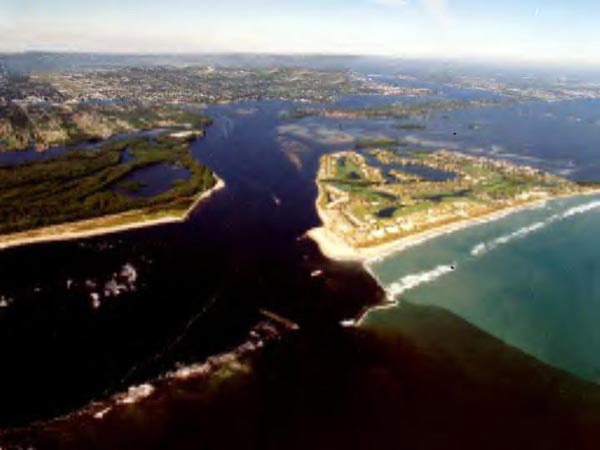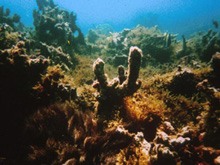
Figure 1: The Marine Science Building at Harbor Branch Oceanographic Institute in Ft. Pierce, Florida. This building is still uninhabitable following destruction to it by Hurricanes Frances and Jean in 2004. Click image for larger view and image credit.
Figure 2: Sailfish Point, Florida, where the St. Lucie River flows from the inlet into the Atlantic Ocean, revealing the impact of siltation on near-shore reef formations in the Atlantic Ocean. This image shows the demarcation between fresh water from Lake Okeechobee after Hurricane Frances. Click image for larger view and image credit.
Another View of Hurricanes
November 7, 2005
Richard Grant Gilmore, Jr., Ph.D.
William W. Schroeder, Ph.D.
With the busiest Atlantic hurricane season on record coming to an end, we are all painfully aware of the destructive quality of these bundles of energy. (Figure 1) A relatively new area of study, however, is the ecological importance of hurricanes to natural communities. Many organisms can and do cope with hurricanes and actually use them to their benefit.
The sand pine tree which grows on coastal sand dunes may use hurricanes to reproduce. The cones of this pine tree typically germinate in the presence of high heat, i.e., forest fires. This causes the very hard seed coating to expand and crack open so the seedling can begin germinating. After Hurricanes Frances and Jean, scientists noted new pine seedlings sprouting throughout the hurricane's path. The parent trees fell during the storm and the cones opened, releasing their seeds. It is hypothesized that these seeds have also evolved to germinate after trees fall and begin to release their nutrients into the ground as they decay. The enrichment of soil with new plant material from fallen trees, leaves, and branches is possibly one of the greatest natural resources benefits of hurricanes, besides obvious recharging of shallow aquifers with water.
Marine ecosystems can also benefit from hurricanes. Coastal embayments, such as Florida Bay and Mobile Bay, are constantly filling up with sediments carried from the land. Hurricanes stir up these fine sediments and push them out to sea, thus extending the life of the bay and "cleaning it up." (Figure 2)
Powerful storms can also cycle sediments which have buried hardground bottom areas in the sea, exposing areas previously buried and burying areas previously exposed. This might be compared to how forest fires function in climax forests, destroying one community, but creating fertile ground for a fresh community.
Strong wind events may break up toxic algal blooms, thus "diluting" toxins. (Figure 3) In addition, water which has become stratified and anoxic (lacking oxygen) near the bottom can be significantly "stirred" up during a strong storm, resulting in a reoxygenation of the water column.
Our particular expedition is not intending to study the effects of the recent hurricanes on marine ecosystems. Given the hurricane season we have just passed through, however, we are mindful of the tremendous power of these storms. As a scientific community, we are just beginning to have the ability to study what influence hurricanes have on deep sea ecosystems and on the open ocean. With the presence of an open ocean observatory network, we will begin to learn more about this process. The natural ecosystem evolved with hurricane cycles. We need to learn and appreciate that and evolve with them, too!
Sign up for the Ocean Explorer E-mail Update List.


























